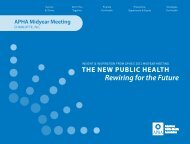EVIDENCE
missingevidence-digitalpdf-singlepages_2016
missingevidence-digitalpdf-singlepages_2016
You also want an ePaper? Increase the reach of your titles
YUMPU automatically turns print PDFs into web optimized ePapers that Google loves.
Case study 9<br />
THE EFFECT OF FRACKING ON HOUSE PRICES<br />
The allegation<br />
According to MPs Barbara Keeley (Labour) and Caroline Lucas (the Green party), and anti-fracking<br />
campaigners, the Department for Environment, Food and Rural Affairs (Defra) censored a study<br />
examining the effect of shale gas drilling on the rural economy, to remove evidence suggesting<br />
that house prices would fall. 44<br />
Timeline<br />
Dec 2013<br />
Jun 2014<br />
Jul 2014<br />
Aug 2014<br />
8 th Jun 2015<br />
1 st Jul 2015<br />
Defra received a request to release information on the economics of shale gas under Environmental<br />
Information Regulations 2004. 51<br />
Request was resubmitted.<br />
Defra responded to the request by publishing ‘Shale Gas Rural Economy Impacts report,’ with large<br />
sections redacted.<br />
The Guardian, 44 Daily Mail 45 and Telegraph 46 ran stories criticising the redaction.<br />
Following a contested Freedom of Information request, the Information Commissioner required Defra<br />
to publish an unredacted version of the report. 47<br />
Defra published the unredacted report. 48<br />
How were government policy and public debate affected?<br />
The present government is committed to expanding fracking for shale gas. It is unlikely that full publication would have<br />
altered policy, but it would have allowed greater scrutiny of the potential impacts of this policy.<br />
The public debate about fracking has focused on the risks to health and the environment from the technique,<br />
and on the potential economic impacts. Much of the available evidence on risks to health and the environment is from<br />
the USA, which differs significantly from the UK geologically and in how fracking is regulated. Nonetheless a review<br />
of this evidence by the Royal Society and the Royal Academy of Engineering concluded concluded that “the health,<br />
safety and environmental risks can be managed effectively in the UK” and that “seismic risks are low.” 49 Despite this<br />
evidence being publicly available, media reporting of fracking frequently overstates the known risks and leaves<br />
the public ill-informed. 50<br />
In publishing a redacted version of this study, Defra acknowledged the public interest in the information being published.<br />
But it also stated: “there is a strong public interest in withholding the [redacted] information because it is important that<br />
officials can consider implications of potential impacts and scenarios around the development of the shale gas industry<br />
and to develop options without the risk that disclosure of early thinking, could close down discussion.” 51<br />
Defra failed to acknowledge that the redaction created a void, which was filled by speculation and anecdote in place<br />
of evidence, and which made it harder for the public to judge the claims that fracking will benefit the country economically.<br />
44 Mason, R (2014)<br />
45 Spencer, B (2014)<br />
46 Lean, G (2014)<br />
47 Information Commissioner’s Office (2015)<br />
48 Department for Environment, Food and Rural Affairs (2015)<br />
49 The Royal Society and the Royal Academy of Engineering (2012)<br />
50 Sense about Science (2014)<br />
51 Department for Environment, Food and Rural Affairs (2014b)<br />
SECTION 3: REASONS FOR THE DELAYED PUBLICATION OR WITHHOLDING OF GOVERNMENT RESEARCH<br />
26



